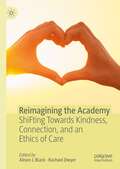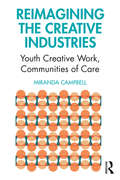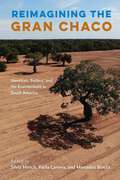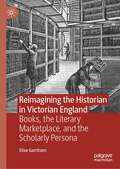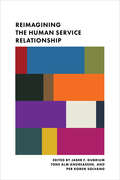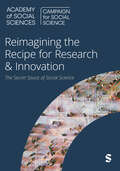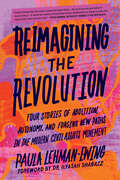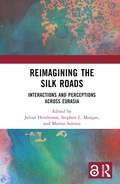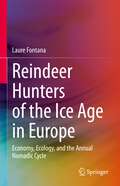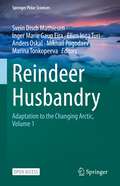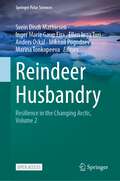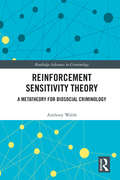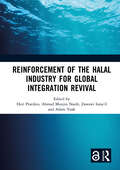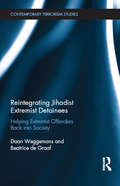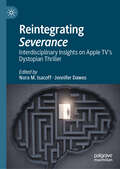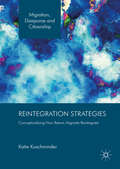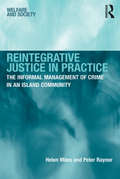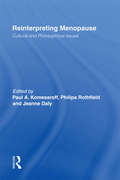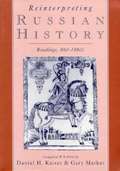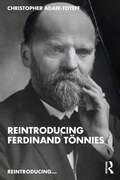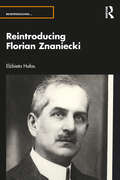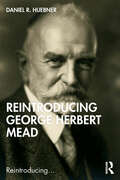- Table View
- List View
Reimagining the Academy: ShiFting Towards Kindness, Connection, and an Ethics of Care
by Rachael Dwyer Alison L BlackThis book explores the capacities and desires of academic women to reimagine and transform academic cultures. Embracing and championing feminist scholarship, the research presented by the authors in this collection holds space for a different way of being in academia and shifts the conversation toward a future that is hopeful, kind and inclusive. Through exploring lived experiences, building caring communities and enacting an ethics of care, the authors are reimagining the academy’s focus and purpose. The autoethnographic and arts-based research approaches employed throughout the book provide evocative conceptual content, which responds to the symbolic nature of transformation in the academy. This innovative volume will be of interest and value to feminist scholars, as well as those interested in disrupting and rejecting patriarchal academic structures.
Reimagining the Creative Industries: Youth Creative Work, Communities of Care
by Miranda CampbellThis book documents the rise in youth creativity, entrepreneurship, and collective strategies to address systemic barriers and discrimination in the creative industries and create an expanded, more diverse, inclusive, equitable, and caring field. Although the difficulties of entering and making a living in the creative industries—a field which can often perpetuate dominant patterns of social exclusion and economic inequality—are well documented, there is still an absence of guidance on how young creatives can navigate this environment. Foregrounding an intersectional approach, Reimagining the Creative Industries responds to this gap by documenting the work of contemporary youth collectives and organizations that are responding to these systemic barriers and related challenges by creating more caring and community-oriented alternatives. Mobilizing a care ethics framework, Miranda Campbell underscores forms of care that highlight relationality, recognize structural barriers, and propose new visions for the creative industries. This book posits a future where creativity, collaboration, and community are possible through increased avenues for co-creation, teaching and learning, and community engagement. Anyone interested in thinking critically about the creative industries, youth culture, community work, and creative employment will be drawn to Campbell's incisive work.
Reimagining the Gran Chaco: Identities, Politics, and the Environment in South America
by Silvia Hirsch, Paola Canova, and Mercedes BioccaThis volume traces the socioeconomic and environmental changes taking place in the Gran Chaco, a vast and richly biodiverse ecoregion at the intersection of Argentina, Bolivia, Brazil, and Paraguay. Representing a wide range of contemporary anthropological scholarship that has not been available in English until now, Reimagining the Gran Chaco illuminates how the region’s many Indigenous groups are negotiating these transformations in their own terms. The essays in this volume explore how the region has become a complex arena of political, cultural, and economic contestation between actors that include the state, environmental groups and NGOs, and private businesses and how local actors are reconfiguring their subjectivities and political agency in response. With its multinational perspective, and its examination of major themes including missionization, millenarian movements, the Chaco war, industrial enclaves, extractivism, political mobilization, and the struggle for rights, this volume brings greater visibility to an underrepresented, complex region.
Reimagining the Historian in Victorian England: Books, the Literary Marketplace, and the Scholarly Persona
by Elise GarritzenThis book traces the transformation of history from a Romantic literary pursuit into a modern academic discipline during the second half of the nineteenth century, and shows how this change inspired Victorians to reconsider what it meant to be a historian. This reconceptualization of the ‘historian’ lies at the heart of this book as it explores how historians strove to forge themselves a collective scholarly persona that reflected and legitimised their new disciplinary status and gave them authority to speak on behalf of the past. The author argues that historians used the persona as a replacement for missing institutional structures, and converted book parts to a sphere where they could mould and perform their persona. By ascribing agency to titles, footnotes, running heads, typography, cover design, size, and other paratexts, the book makes an important shift in the way we perceive the formation of modern disciplines. By combining the persona and paratexts, it offers a novel approach to themes that have enjoyed great interest in the history of science. It examines, for example, the role which epistemic and moral virtues held in the Victorian society and scholarly culture, the social organization and hierarchies of scholarly communities, the management of scholarly reputations, the commercialization of knowledge, and the relationship between the persona and the underpinning social, political, economic, and cultural structures and hierarchies. Making a significant contribution to persona studies, it provides new insights for scholars interested in the history of humanities, science, and knowledge; book history; and Victorian culture.
Reimagining the Human Service Relationship
by Jaber Gubrium Tone Andreassen Per SolvangThe traditional lines of demarcation between service providers and service users are shifting. Professionals in managed service organizations are working to incorporate the voices of service users into their missions and the way they function, and service users, with growing access to knowledge, have taken on the semblances of professional expertise. Additionally, the human services environment has been transformed by administrative imperatives. The drive toward greater efficiency and accountability has weakened the bond between users and providers.Reimagining the Human Service Relationship is informed by the premise that the helping relationship should be seen as developing in the interactive space between those who provide human services and those who receive them. The contributors to this volume redefine the contours, roles, institutional divisions, means, and aims of providing and receiving services in a range of settings, including child welfare, addiction treatment, social enterprise, doctoring, mental health, and palliative care. Though they advocate an experience-near approach, they remain sensitive to the ambiguities and competing rationalities of the service relationship. Taken together, these chapters reimagine the service relationship by making visible the working relevancies of service delivery.
Reimagining the Recipe for Research & Innovation: the Secret Sauce of Social Science
by Campaign for Social ScienceThere is a critical yet under-explored role for the social sciences within the UK’s research, development and innovation system. This report argues that the social sciences can elevate this country’s research output to a world-leading level. There is, however, a danger of the social sciences being seen as an add-on or afterthought to STEM research whereby social scientists’ contributions are limited to identifying or ameliorating potentially negative ethical, legal or societal implications of scientific or technological advances. Our argument in this report is that social scientists have an essential role to play across the entire recipe - catalysing the development of new flavours - rather than simply being a garnish to a dish created by STEM. Ideas from social science need to be incorporated into STEM research right from the beginning, thereby enriching our perspectives and understanding of global challenges. Case studies include how social science can help us to develop effective climate change policies, combat AIDS rates amongst young people in South Africa, and assess the impact of AI technology on human rights. The report provides a systematic overview of the ways in which social science can benefit STEM research: 1. Social sciences enable whole systems thinking. 2. Social sciences are critical for good policy development. 3. Social sciences underpin smart & responsible innovation. 4. Social sciences are essential to international collaboration and tackling shared global challenges.
Reimagining the Recipe for Research & Innovation: the Secret Sauce of Social Science
by Campaign for Social ScienceThere is a critical yet under-explored role for the social sciences within the UK’s research, development and innovation system. This report argues that the social sciences can elevate this country’s research output to a world-leading level. There is, however, a danger of the social sciences being seen as an add-on or afterthought to STEM research whereby social scientists’ contributions are limited to identifying or ameliorating potentially negative ethical, legal or societal implications of scientific or technological advances. Our argument in this report is that social scientists have an essential role to play across the entire recipe - catalysing the development of new flavours - rather than simply being a garnish to a dish created by STEM. Ideas from social science need to be incorporated into STEM research right from the beginning, thereby enriching our perspectives and understanding of global challenges. Case studies include how social science can help us to develop effective climate change policies, combat AIDS rates amongst young people in South Africa, and assess the impact of AI technology on human rights. The report provides a systematic overview of the ways in which social science can benefit STEM research: 1. Social sciences enable whole systems thinking. 2. Social sciences are critical for good policy development. 3. Social sciences underpin smart & responsible innovation. 4. Social sciences are essential to international collaboration and tackling shared global challenges.
Reimagining the Revolution: Four Stories of Abolition, Autonomy, and Forging New Paths in the Modern Civil Rights Movement
by Paula Lehman-EwingThese are the architects of the modern civil rights movement: 4 profiles of revolutionary groups making change beyond protestA radically different approach to sustaining social justice movements—4 strategies for abolition and liberation from the new architects of the modern civil rights movementMany of us think, I don&’t support the police. But what should take their place? Or: Prisons don&’t keep us safe. But what new systems could?A lot of books about racial justice ask us how we got here, but Reimagining the Revolution is different: award-winning journalist and activist Paula Lehman-Ewing presents an inside-access look at the activists redefining where we go from here. Readers will hear from:Ivan Kilgore, an incarcerated activist who founded the 501c3 nonprofit United Black Family Scholarship Foundation from behind prison wallsCritical Resistance, one of the oldest grassroots organizations in the nation working to dismantle the prison-industrial complexThe co-founders of Greenwood, a Black-owned financial technology institution designed specifically for Black and Latino people and businesses: Michael Render, aka Killer Mike, Amb. Andrew Young and Ryan GloverIncarcerated activist Heshima Denham on his grassroots efforts to build a society for Black and Brown people independent of the state The Movement for Black Lives, the Alliance for Safety and Justice, BYP 100, and 8toAbolitionIncarcerated and formerly incarcerated artists using art to heal from trauma, connect with other incarcerated people, and amplify abolitionist changeLehman-Ewing frames each profile within two fundamental truths: The current system—built and sustained by oppression, extraction, and inequity by design—cannot be reformed. And, knowing this, we need abolition; we need creative solutions designed by the people most impacted by the systems they fight to change. Reimagining the Revolution is a call to action for each of us: if we can access the tools we have, we can dream bigger, think outside the box, and follow the paths laid out by change-making activists toward nothing short of revolution.
Reimagining the Silk Roads: Interactions and Perceptions Across Eurasia
by Stephen L. Morgan Julian Henderson Matteo SaloniaThis book brings together scholars from many disciplines to shed light on the long history of the silk roads, to redefine it, and to demonstrate its vitality and importance.Reimagining the Silk Roads illuminates economic, spiritual, and political networks, bridging different chronologies and geographies. Richly illustrated, it explores fascinating topics, including archaeological discoveries, oceanic explorations, the movement, and impact of ideas, and the ways in which the silk roads, broadly defined, contributed to processes of globalization. Reconciling the study of land and sea routes, and paying attention to themes such as material culture, environment, trade, and the role of religious faiths, the authors offer complex yet accessible studies of the history of interactions and perceptions across Eurasia over the last 3,000 years. The editors critically respond to the recent politicisation of the silk roads and reflect on their polycentric character.The book challenges and revives silk roads studies, and it will be relevant not only to researchers in archaeology, history, heritage and related fields, but also to the general reader.
Reimagining with Christian Doctrines: Responding to Global Gender Injustices
by Grace Ji-Sun Kim Jenny DaggersThis collection demonstrates a constructive potential in reimagining with doctrines, which unlocks them from centuries of patriarchal constraint. It opens the way for glimpsing divine action in the economy of salvation, while human struggles for justice are placed within a wider arena when discrete theological resources are deployed in this way.
Reina
by Elizabeth DuvalPrimeras memorias en España de una mujer de la generación Z que a los 19 años ya es un referente de la poesía y del activismo. «Yo creo -escribe Elizabeth Duval en Reina - que estaba enamorada de ella porque era como un personaje novelesco, una gran aparición del azar, una fuerza sin rumbo ni dirección alguna.» Aunque a lo largo de la historia el dilema entre la escritura o la vida ha influido en numerosas obras, lo cierto es que la respuesta más sensata siempre estuvo a la vista de todo el mundo, tal y como podemos deducir con la lectura de este libro: la literatura y la vida. Estudiante en París de Filosofía y Letras Modernas, la escritora y activista Elizabeth Duval (Alcalá de Henares, 2000) inicia un diario que inevitablemente acaba transformando su realidad, mediada por una especie de concepción novelesca de la propia existencia. Con un talento excepcional para hacer dialogar su prosa con la historia de las ideas, proponiendo así un interesante dispositivo de estimulación intelectual, a lo largo de Reina circulan numerosos asuntos que zigzaguean entre las esferas de lo público y lo privado. Entre sus temas destacan la vida universitaria como iniciación a la madurez, la política bajo el capitalismo tardío, o el amor postadolescente desde una óptica que desborda todas nuestras expectativas sobre el asunto y lo sublima en una reflexión sobre los afectos y el deseo tan universal como radicalmente nueva. La crítica ha dicho...«Una escritora transfemenina, filósofa, muy precoz y muy impresionante»Luna Miguel «Imparable.»Play Ground «En Reina, abre su corazón con los primeros diarios de una mujer de la Generación Z [...] De lo más esperado de este año.»Begoña Alonso, Elle «Uno de los emblemas más visible de la causa trans.»Tentaciones «La joven madrileña tiene todo para convertirse en la próxima estrella de la filosofía española [. . .] Sorprende, sobre todo, la madurez del discurso de Duval, además de su amplia cultura.»Víctor Lenore, Vozpópuli
Reindeer Hunters of the Ice Age in Europe: Economy, Ecology, and the Annual Nomadic Cycle
by Laure FontanaThis book undertakes a thorough study of Reindeer in the Upper Pleniglacial and Tardiglacial societies in France. It addresses two main topics – the economy of animal resources within the societies and the exploitation of Reindeer organized within the annual cycle, in terms of space and time, between 30,000 and 14,000 cal BP in France. The author proposes an analysis and hypothesis regarding the economy of animal resources and the nomadic cycle of the last Paleolithic hunter-gatherer societies, in order to identify a “Reindeer system.”The author discusses the relationship between Reindeer and human mobility and offers some conclusions regarding the annual cycles of nomadism. The volume scrutinizes the distinct eco systems in three regions and its effects on the movements of both human and animal. This book is of interest to zooarchaeologists and prehistorians.
Reindeer Husbandry: Adaptation to the Changing Arctic, Volume 1 (Springer Polar Sciences)
by Anders Oskal Svein Disch Mathiesen Inger Marie Gaup Eira Ellen Inga Turi Mikhail Pogodaev Marina TonkopeevaThis open access book focuses on climate change, Indigenous reindeer husbandry, and the underlying concept of connecting the traditional knowledge of Indigenous reindeer herders in the Arctic with the latest research findings of the world’s leading academics. The Arctic and sub-Arctic environment, climate, and biodiversity are changing in ways unprecedented in the long histories of the north, challenging traditional ways of life, well-being, and food security with legitimate concerns for the future of traditional Indigenous livelihoods. The book provides a clear and thorough overview of the potential problems caused by a warming climate on reindeer husbandry and how reindeer herders’ knowledge should be brought to action. In particular, the predicted impacts of global warming on winter climate and the resilience of the reindeer herding communities are thoroughly discussed.
Reindeer Husbandry: Resilience in the Changing Arctic, Volume 2 (Springer Polar Sciences)
by Anders Oskal Svein Disch Mathiesen Inger Marie Gaup Eira Ellen Inga Turi Mikhail Pogodaev Marina TonkopeevaThis open access book focuses on climate change, indigenous reindeer husbandry and the underlying concept of connecting the traditional knowledge of indigenous reindeer herders in the Arctic with the latest research findings of the world’s leading academics. The Arctic and sub-Arctic environment, climate and biodiversity are changing in ways unprecedented in the long histories of the north, challenging traditional ways of life, well-being, and food security with legitimate concerns for the future of traditional indigenous livelihoods. The book provides a clear and thorough overview of the potential problems caused by a warming climate on reindeer husbandry and how reindeer herders' knowledge should be brought to action. In particular, the predicted impacts of global warming on winter climate and the resilience reindeer of communities are thoroughly discussed.
Reinforcement Sensitivity Theory: A Metatheory for Biosocial Criminology (Routledge Advances in Criminology)
by Anthony WalshSome of the brightest minds in criminology who were nurtured on the strictly environmentalist paradigm of the 20th century have declared that biosocial criminology is the paradigm for the 21st century. This book attempts to unite this ever-growing field with the premier neurobiological theory of personality, otherwise known as reinforcement sensitivity theory (RST). Anthony Walsh places the highly variable number of biosocial approaches under a single theoretical umbrella, whilst providing a unique integrative framework. As the leading neurobiological theory of personality and behavior in psychology today, RST focuses around the age-old question of how naturally selfish social animals can achieve their wants and needs without alienating others in their social groups. RST posits that evolution has built into humans three interacting systems: the behavioral approach system; the behavioral inhibition system; and the fight/flight/freeze system. RST identifies the neurobiological and genetic functions underlying each system and has found a cascade of supporting evidence. Throwing new light on many areas of concern to criminologists, such as psychopathy, violence, ADHD, and schizophrenia, this book will be of interest to scholars and upper-level students in the field. Additional features such as Focus Boxes and diagrams delve into measurement techniques and brain areas.
Reinforcement of the Halal Industry for Global Integration Revival: Proceedings of the 2nd International Conference on Halal Development (ICHaD 2021), Malang, Indonesia, 5 October 2021
by Zawawi Isma’il Heri Pratikto Adam Voak Ahmad Munjin NasihThe emergence of a Halal industry in the past decade in the fields of food, beverages, and services, emphasizes the importance of providing a more complete understanding of Halal products, current Halal developments and other topics of Halal development. This groundbreaking volume provides theoretical and empirical studies on the Halal industry. This book explores critical issues, best practice examples, and draws on a range of international case studies to demonstrate theory in practice of the Halal industry. Emphasizing the Halal industry, the chapters address a number of important issues such as Halal assurance system, Halal product certification, Halal tourism, Human Resources of Halal Certification, supply chain of Halal products, and other related subjects.This book will be of interest to students, scholars, and practitioners who have a deep concern and interest in the Halal industry. It is futuristic with a lot of practical insights for students, faculty members, and practitioners. Since the contributors are from across the globe, it is fascinating to see the global benchmarks.
Reintegrating Jihadist Extremist Detainees: Helping Extremist Offenders Back into Society (Contemporary Terrorism Studies)
by Daan Weggemans Beatrice de GraafThis book seeks to understand the processes of reintegration of former Jihadist detainees, as well as the role that the police and other frontline professionals play in this process. Over the past few decades the number of people who have been detained under the suspicion of terrorist activities has grown significantly. This has resulted in an increased scholarly interest in the topic of prisons and terrorism. However, the main focus of academic research has been on the period of incarceration with researchers paying extensive attention to the conditions under which terrorists have been detained as well as to various processes of alienation and (violent) radicalisation that sometimes take root while in prison. Much less has been written about the period after their incarceration and the steps being taken to prepare them for that transition. This book seeks to fill this gap. It argues that sentencing or incarcerating terrorism suspects is not the end of the story, but just the beginning of the next phase: a process of reintegration, or the start of a new cycle of violence. This exploratory study outlines the factors during and after detention that contribute or hinder the reintegration of those who have been incarcerated for violent extremism and terrorism. The overriding aim of this work is to facilitate further research into the radicalisation and de-radicalisation of jihadist suspects. This book will be of much interest to students of terrorism and counter-terrorism, Islamist radicalisation, criminology and security studies in general.
Reintegrating Severance: Interdisciplinary Insights on Apple TV’s Dystopian Thriller
by Jennifer Dawes Nora M. IsacoffThis edited collection is an interdisciplinary examination of Apple TV's Severance, in which employees of a biotech firm consent to having their brains severed so that their work selves and non-work selves do not retain each other’s memories. What transpires is a reckoning with the very nature of the self, consciousness, and memory, through a series steeped in explorations of capitalism, social welfare, and bioethics. Chapters in this book examine the popularity and critical acclaim surrounding the show; its retrofuturistic asethetic; its commentary on popular culture and identity; and its engagement with nostalgia, among other topics.
Reintegration Strategies
by Katie KuschminderThis book critically examines and theorizes the process of how return migrants reintegrate into their countries of origin. The result is a new methodology for understanding the experiences of return migrants, or their 'reintegration strategies'. This approach demonstrates that reintegration strategies differ by type of return migrant, leading to variations in how far they are able to contribute to the development of their nation states. The author uses female return migration to Ethiopia as a case study, focusing on the impact of gender on reintegration strategies to analyse the connection between return migration and social change. This book will appeal to scholars of migration and refugee studies, as well as a wider audience of sociologists, anthropologists, demographers and policy makers.
Reintegrative Justice in Practice: The Informal Management of Crime in an Island Community (Welfare And Society Ser.)
by Peter Raynor Helen MilesRecent years have seen the development of a growing international literature on restorative justice, community justice and reintegrative alternatives to formal criminal justice processes. This literature is stronger on theory and advocacy than on detailed evaluative studies. It often relies for its practical examples on the presumed historical practices of the indigenous peoples of colonised territories, or on attempts to revive or promote modified versions of these in a modern context, which has led to debates about how far modern communities can provide a viable setting for such initiatives. This book provides a unique study of the practice of traditional reintegrative community justice in a European society: the Parish Hall Enquiry (PHE) in the Channel Island of Jersey. This is an ancient institution, based on an informal hearing and discussion of a reported offence with the alleged offender and other interested parties, carried out by centeniers (honorary police officers elected to one of Jersey's twelve parishes). It is still in regular use as an integral part of a modern criminal justice system, and it usually aims to resolve offences without recourse to formal prosecution in court. Helen Miles and Peter Raynor's research, arising from direct observation, contributes to the literature on 'what works' in resolving conflicts and influencing offenders, and their detailed case studies of how problems are addressed gives a 'hands on' flavour of the process. The authors also document the aspects of community life in Jersey that facilitate or hinder the continuation of the PHEs, drawing out the implications of these findings for wider debates about the necessary and sufficient social conditions for reintegrative justice to succeed.
Reinterpreting Menopause: Cultural and Philosophical Issues
by Paul A. Komesaroff Philipa Rothfield Jeanne DalyReinterpreting Menopause brings together a number of reflections from a broad range of areas including feminism, cultural studies, clinical medicine, sociology, philosophy and political science and includes the voices and experiences of menopausal women themselves. In an innovative series of essays, current thinking about medicine, society and the body is critically examined. Particular attention is given to the medical representations of menopause, biology and aging, the history of medical approaches to women and the tensions between bio-medical models and other explanations of menopause. Contributors include: E. Ann Kaplan, Emily Martin, Mia Campioni, Fiona Mackie, Roe Sybylla, Wendy Rogers, Kwok Lei Leng, Margaret Morganroth Gullette and Robyn Gardner.
Reinterpreting Russian History: Readings, 860-1860's
by Gary Marker Daniel H. KaiserThis book aims to reflect the latest scholarship on Russian history from its beginnings to the 1860s. Grouped around four chronological units, it features both primary and secondary sources which treat recurring themes of state structure, economy, society, and culture and everyday life, with special attention to gender and cultural history.
Reintroducing Ferdinand Tönnies (Reintroducing...)
by Christopher Adair-ToteffExploring, clarifying, and moving beyond the distinction between ‘community’ and ‘society’ for which he is best known, this book rediscovers the work of Ferdinand Tönnies, providing fresh insights into his thought, which are often overlooked for want of a grasp of his background in philosophy. With attention to the fact that Tönnies always wrote from a sociological perspective, it considers the importance of the breadth of his writing on a range of subjects, including politics, philosophy, economics, and ethics, these being the foundations of social policy—a field with which Tönnies was concerned as a scholar who sought not only to understand the world but also to change it for the better. The first book to provide an accessible overview of Tönnies' work that places his thought in context, explores his key concepts, and demonstrates his continuing relevance in sociology—a discipline he helped to establish—Reintroducing Ferdinand Tönnies will appeal to scholars and students with interests in social theory, the history of sociology, and the sociology of Ferdinand Tönnies.
Reintroducing Florian Znaniecki (Reintroducing...)
by Elżbieta HałasThis book reintroduces the work of Florian Znaniecki (1882–1958) as an innovative constructor of modern sociology who viewed the processes of modernity through the prism of culture and rediscovers his relational thought on the emergence and transformation of cultural and social systems.Exploring the contribution of Znaniecki’s philosophy of culturalism to the cultural approach in sociology, it shows the importance of Znaniecki’s work for the foundation of sociology as one of the cultural sciences. Through an examination of his work on the world society from a cultural perspective, the author reveals Znaniecki to have been a pioneer of global sociology and shows that sociology has much to gain from a fuller appreciation of his legacy in its understanding of processes of social and cultural change.Aimed at students and researchers of sociology, Reintroducing Florian Znaniecki will appeal to those with interests in the dynamics of culture, the cultural sciences, theoretical sociology, and sociological methods. It presents stimulating analytical concepts and offers inspiration for research in many areas, including knowledge, science, education, creative leadership, the emergence of modern nations and world society.
Reintroducing George Herbert Mead (Reintroducing...)
by Daniel R. HuebnerGeorge Herbert Mead has long been known for his social theory of meaning and the ‘self’ - an approach which becomes all the more relevant in light of the ways we develop and represent ourselves online. But recent scholarship has shown that Mead’s pragmatic philosophy can help us understand a much wider range of contemporary issues including how humans and natural environments mutually influence one another, how deliberative democracy can and should work, how thinking is dependent upon the body and on others, and how social changes in the present affect our understandings of the past. Historical scholarship has also changed what we know of Mead’s life, including new emphasis on his social reform efforts, his engagement with colonization and war, and critical reinterpretation of the works published after his death. This book provides an approachable introduction to Mead’s contemporary relevance in the social sciences, showing how a pragmatic view of social action serves as the core of Mead’s theory, offering striking insights into human agency, symbolism, politics, social change, temporality, and materiality. As such, it will appeal to scholars of sociology and the social sciences more broadly, with interests in social theory and the enduring importance of the sociological classics.
